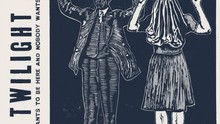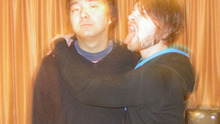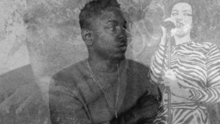On August 4 Conor Oberst will release his new self-titled solo album, which was recorded in Tepoztlán, Mexico with a small group of musicians at the dawn of this year. In a relatively similar fashion to our reassessment of the Manic Street Preachers’ back catalogue earlier this year, DiS considers how a barely pubescent Oberst traversed from four-track recordings in the basement of his family home to standing at the cusp of unleashing one of 2008’s most anticipated records.
Almost every song Oberst has recorded since he was but a wee one is out there somewhere if you look hard enough. The chance, then, to appreciate his growth and increasing range - from the very, very beginning - is there. What follows is intended as exhaustive to a point though by no means definitive; rather a loosely autobiographical reassessment of key works. If you care to join…
Desaparecidos
Read Music/Speak Spanish
(2002, Saddle Creek / 2005, Wichita)
Then: I was first introduced to the music of Conor Oberst some six years ago – almost, if memory serves, exactly six years ago – through a copied tape recording of Desaparecidos’ Read Music/Speak Spanish given to me by a friend. A few nights previous, said friend had been watching MTV2 when the channel played ‘The Happiest Place On Earth’ in the early hours of the morning (sans video – simply the song with a blue screen visual) leading him to seek out more immediately. The tape repeatedly found its way into my stereo – in this scratchy, raw and none-more-boisterous recording (laid down in but a week) melodic nous and crashing synth and guitars collided, held together by indignant and perceptive lyrics taking the Midwest hometown of the band as a model whereby they could explore the wilful damage capitalism wreaks on almost all aspects of society, and more so what it means to be young, (American) and thoroughly disillusioned. This album sat alongside the seminal works of Glassjaw, Thursday and At The Drive-In at the time, sound-tracking countless road trips, barbecues and parties, heralding a new age of independence in my twilight teenage years.
Now: Constant revisits in the intervening years only reinforce the strident quality of this record, awash as it is with righteous anger, assured intelligence and simply colossal tunes. The other players in the band remain affiliated with the Omaha music scene, guitarist Denver Dalley finding some success with his two (wonderful) albums strong Statistics project, Intramural and City Lights, while Matt Baum drummed for The ’89 Cubs. From the Pixies-esque caterwaul of ‘Greater Omaha’ through the shimmering resentment of ‘The Happiest Place On Earth’ and delicious hooks that flavour ‘Mañana’ and the ‘Man And Wife’ pair, this work of theirs truly deserves the reverence many afford it today. And then, of course, there’s that voice…
Bright Eyes
Fevers & Mirrors
(2000, Saddle Creek / 2005, Wichita)
Then: Wut? Desaparecidos but a side project? Convinced I’d found my new favourite band, this was most unwelcome news. Oh well though: at least the main-man seemed to head up another band. Research taking in the esteemed words of Teletext’s Planet Sound and that of a certain popular online shopping centre saw me go with this album as my first Bright Eyes purchase. Bit different to Desaperacidos it seemed too, despite the Spanish-speaking child brokenly reading from a book who opens the album (one of the Mexican children kicking rocks in the street on the closing ‘A Song To Pass The Time’, perhaps). Thematically a sense of disenchantment reigned; in the aching sadness of ‘A Spindle, A Darkness, A Fever, And A Necklace’ Oberst’s voice palpably trembles, quivering on the point of tears as he relays an abstract tale touching on substance abuse and abject loneliness. Featuring musical contributions from, among others, ex-Commander Venus pal Tim Kasher (of Cursive and The Good Life), this album endeared itself with immediate effect; stuffed with delightful melodies and instrumentation, in possession of enough lyrical pathos and reflection to take your breath away.
Now: Strongly evocative once more, this remains an album to admire. Placing it in the context of everything that has come before and since, it’s not too much of a leap to suggest that, lyrically at least, this is where Oberst found his feet; in a literate set of compositions at once beautiful (an optimistic heart oft-unnoticed beats strong in ‘An Attempt To Tip The Scales’) and abrasive (witness: the screaming climax of ‘When The Curious Girl Realises She Is Under Glass’, the muscular drive of ‘Sunrise, Sunset’). If anything jars these days, it’s the extreme self-reflexivity on display, culminating in the bizarre ‘radio interview’ towards the end of the record, where Todd Fink (of The Faint) plays Oberst in an increasingly surreal exchange concerning the confessional themes that permeate the album itself. The sweet acoustic finale that follows is slightly marred, in retrospect, through admission/fear of “mediocrity” at its close. Yet of course it’s the very mixture of vulnerability and compassion this song exemplifies that makes Oberst such a fascinating and treasured character – and this album, for many, remains a high watermark.
Bright Eyes
Lifted Or The Story Is In The Soil, Keep Your Ear To The Ground
(2002, Saddle Creek / 2005, Wichita)
Then: Where to go after Fevers? Where else… I have a distinct memory of picking this album up in Exeter on a sunny day with a group of friends. Clutching it tight and scanning the exhaustive liner notes (set out, fittingly, with each song as a chapter), I even expressed how I knew – just knew – it would be amazing. A sprawling work that opens with, as I’d come to expect, its least accessible though entirely necessary track, the sheer ambition on display from a musician barely into his 20s staggered me then, as it does…
Now: Listening back, this album retains the same sense of majesty it held and impressed upon my 18-year-old self. The aforementioned method of setting it out as a novel makes perfect sense – from ‘The Big Picture’ onwards (“The picture’s far too big to look at, kid / Your eyes won’t open wide enough”), where a group of friends jam a cassette into a car stereo, to its rambunctious epiphany of a finale, the words and concerns expressed – in sequence – add up to an impressive, greater-than-the-sum-of-its-parts work. Which isn’t to say that it isn’t rammed full of fantastic stand-alone songs recorded in a riotous warehouse-cum-studio by a group of inordinately talented friends and musicians – pick any of its 13, from the sanguinity that envelopes ‘Bowl Of Oranges’ to the despondent chime of ‘Lover I Don’t Have To Love’ and existential musings of ‘Don’t Know When But A Day Is Gonna Come’ – I would do as well to type the tracklist; they’re all prime. But taken as a breathless, all-encompassing whole, it’s… well, it’s about as perfect as they come.
Bright Eyes
A Collection Of Songs Written And Recorded 1995-1997
(1998, Saddle Creek)
Then: Where now, you say? Let’s reverse, then, return, retreat. If not to the very beginning, then to a foundation of sorts. Effectively doing as its title promises (housing much of Oberst’s basement four-track output in the given time-span), Collection’s disc itself is emblazoned with the following legend, courtesy of Peggy P. Stierman from The Glass Eye: “How many of these do you think there are out there? It’s not too hard to imagine. A guy growing up in the ‘80s with a love for the Violent Femmes and the Flaming Lips recording on a four track in the basement whenever he’s depressed or in an over analyzing mood. It’s also not too hard to imagine that most of it is crap.”
Now: Peggy P. Stierman, whoever she may be, wasn’t exactly bang on the money in this instance. These 20 songs are raw, scratchy and hardly classic stuff, but even at this tender age (Oberst would have been in his mid-teens, concurrently playing in Commander Venus and putting these songs together), there is a fine poetic heart developing – exploring themes that inform his writing to this day, chiefly: family, friends, relationships and escape – in whatever form that may take. “There’s a boy in a basement with a four track machine / He’s been strumming and screaming all night, down there,” Oberst later sings, but I’m getting ahead of myself here. Collection, now, is a difficult albeit occasionally fascinating listen, standouts perhaps the penultimate (subsequently re-recorded) ‘Feb.15’ (on which Oberst duets with former girlfriend and Tilly And The Wall member Neely Jenkins) and ‘The Feel Good Revolution’ where none other than Oberst Senior contributes a lead guitar line. Instrumental opener ‘The Invisible Gardener’ – fluffed notes and all – makes for an infectious, immediately accessible first track too. Take note: this would not be a recurring theme.
Bright Eyes
Letting Off The Happiness
(1998, Saddle Creek)
Then: The first Bright Eyes album ‘proper’ is notable in many instances, though chiefly for building on the groundwork laid prior with aplomb. It saw the blossoming of a working relationship past (and future) with Andy LeMaster (Now It’s Overhead, Azure Ray) and guest spots from Neutral Milk Hotel and of Montreal players. Although a weighty sense of angst is certainly present, ‘Contrast And Compare’ dashes the distraught wail (musically, at least) of ‘Padraic My Prince’ in its sweet, languid and occasionally crunchy strum, while ‘Touch’ confidently adds elements of psychedelia to the fold.
Now: Interesting to return to, this one: while it paints a gradual assimilation of various worthy influences, in its own manner it is every bit as much an indication of where Oberst is heading as Fevers – maybe even more so. ‘June On The West Coast’ (a live favourite to this day) deftly communicates a predilection for nomadic behaviour that crops up repeatedly in Oberst’s oeuvre, and ‘Padraic My Prince’ – replete with infamous lyrics concerning a baby brother drowning in a bathtub – is referenced in the following Fevers and again in last year’s Cassadaga-preceding Four Winds EP. Among the frenzied march of ‘The City Has Sex With Itself’ lies the lyric mentioned in discussion of Collection, illustrating a sense of self-awareness that again, would culminate on the consequent album.
Bright Eyes
Various EPs/singles
(dates and labels vary)
In the myriad EPs and rare tracks out there lies a veritable treasure trove of quality – even some of Oberst’s very best material. The highest-regarded splits would be those with Son, Ambulance (Oh Holy Fools, 2000, pictured), Britt Daniel of Spoon (Home: Vol IV, 2004) and Neva Dinova (One Jug Of Wine, Two Vessels, 2004). Fools features the joyous (though unwieldy of title) ‘Oh, You Are The Roots That Sleep Beneath My Feet And Hold The Earth In Place’ – simple in melody, straightforward of lyric, and adorned with flute, mandolin and accordion (maybe, maybe my personal favourite Bright Eyes number), and by contrast the desperately sad, piano-led suicide-attempt of a tune, ‘No Lies, Just Love’ (bolstered, mind, by a (literally) life-affirming upturn).
Home: Vol IV – part (evidently) of a series of collaborations, found a fruitful working relationship with Britt Daniel, and in the fuzzy, bitter guitars of ‘Spent On Rainy Days’ boasts an almost Velvet Underground stomp. On One Jug… pearls to be plucked include the all-too-brief ‘Black Comedy’ and the closing (again, achingly sad, in a manner born out of deepest empathy) ‘Spring Cleaning’ where Jake Bellows (Neva Dinova) takes the lead vocal to tear-jerking effect.
The Sub Pop 7” released in 2001 pre-empted the exercises in more electronic fare that would come to fruition in Digital Ash In A Digital Urn some four years later through its winsome ‘I Will Be Grateful For This Day, I Will Be Grateful For Each Day To Come’ – and, in effect, the pedal-steel flourish of its twin album through the countrified take on ‘When The Curious Girl Realises She Is Under Glass’, while further exploration (or not, for many were collected on 2006’s Noise Floor: Rarities 1998-2005) yields collaborations of note with The Books, The Album Leaf, and Her Space Holiday. There’s No Beginning To The Story (2002) – a sister EP, if you will, to Lifted – is a fine work, as is the earlier Every Day And Every Night (1999) where a dub-heavy bass thrum informs the keening claustrophobia of its closing ‘Neely O’Hara’.
The America-released Four Winds EP (2007) was by contrast a relatively patchy affair, though still boasted the charming ‘Tourist Trap’ and ‘Smoke Without Fire’ (when M. Ward appears almost exactly at the halfway point of this number, the effect is not dissimilar to the return of a long-lost, beloved friend). And that’s not forgetting the bounteous appeal of early gem ‘Drunk Kid Catholic’, ‘The Trees Get Wheeled Away’, barren monologue ‘Mirrors and Fevers’ and covers of Lucinda Williams, Neil Young and Daniel Johnston among others. Looking ahead some, 2006’s live album Motion Sickness also saw a sterling live take – trumpet solo and all – of choice cut ‘Southern State’.
Bright Eyes
I’m Wide Awake It’s Morning / Digital Ash In A Digital Urn
(2005, Saddle Creek)
Then: Late in 2004 Saddle Creek Records released the stark, wintry ‘Lua’ and electronic pulse ‘Take It Easy (Love Nothing)’ as singles, both lifted from aforementioned parent albums, and in an unprecedented display for an independent label took the top two spots on the US Billboard Singles Chart. A staggering achievement, yet one overshadowed by the enduring quality of the company these songs kept. A raft of guest players included Jim James (My Morning Jacket), Nick Zinner (Yeah Yeah Yeahs), Jimmy Tambarello (Dntel, The Postal Service), and Emmylou Harris, none other. Evident on both records is the growing capability of bandmate Mike Mogis in almost every aspect (as a multi-instrumentalist and producer in his own right), as well as a warmth and maturity now fully-fledged on all counts. On a personal level, these albums formed the backdrop to the second year of a university degree and myriad rites of passage that come with, while looking wider, it attracted the kind of across the board critical adulation in the mainstream music press befitting releases of this much worth.
Now: Of the two, Awake is arguably the finer work: playing to Oberst’s strengths as a singer-songwriter of the traditional mould, it is as compact and focused as Lifted was grandiose – a crystallisation and adept harnessing of ability felt throughout an already distinguished career. Influenced as much by the New York rooftops illustrated on its cover as alienation and the gamut of emotions explored previous, ‘Land Locked Blues’ (soul-infused harmonies courtesy of Harris) encapsulates much that is indispensable of this work – the fact that it was written a couple of years earlier when Oberst was but 22 (where it surfaced in different form under the name ‘One Foot In Front Of The Other’ on a Saddle Creek compilation) boggles the mind. It is, in a manner rather more subtle but no less tangible, every bit the equal of Lifted. Digital Ash, meanwhile, dressed its songs in an electronic pop sheen and suffered none for it – less an ‘experimental’ album than another welcome addition to the canon, albeit one that fails to hit the heights quite as emphatically (replete with fine tunes though it is).
Of course, somewhere along the way things got a little out of hand, as the relentless touring around these two releases culminated in a frazzled Oberst making derogatory comments about a certain much-loved British institution at a stage named after him at the country’s biggest music festival (making amends at a Somerset House show only to intone surprise come Glastonbury 2007 for being “invited back”). Another song from this era, ‘When The President Talks To God’ – a wilfully direct denunciation on the Bush democracy as snarling and bitter as ‘First Day Of My Life’ is an unabashedly sweet love song – led to Oberst becoming something of a poster-boy for political awareness among youth in the US, and it was in this exhausted, drained state that he took some time off before embarking on his next album.
Bright Eyes
Cassadaga
(2007, Saddle Creek/Universal)
Then: Arriving off the back of a deal with Universal that many viewed an abandonment of Oberst’s indie roots (though Saddle Creek would still look after its stateside release), this record arrived to the sort of anticipation that could perhaps only bring about disappointment. Influenced by recuperative time spent in the town that gave the album its title (a community of mystics, no less) and recorded in a number of different studios America-wide (orchestras? Check. Massive roll-call of players? Check), the trademark sensibilities infusing his career are all present and correct though the net was cast wider still; less songs are written in the first person, instead featuring a raft of characters from session singers through cheated wives and brakemen of yesteryear.
Now: While never likely to be regarded his finest, Cassadaga remains an almost inexorably fine piece of work. The fiddle-led swing and striking imagery of the apocalyptic ‘Four Winds’ (check out the latter on none-more-sombre ‘No One Would Riot For Less’) and verse after verse of Dylan-esque considered poetry that make up ‘I Must Belong Somewhere’ ensure this, though despite the experimentation with rhythm and sparsity that informs certain cuts, an unavoidable sense lurks that the sleek production sterilises proceedings to a point that, were the songs as unanimously memorable as those mentioned, wouldn’t be quite as evident. That said, it’s a record of hidden depths and scattershot brilliance finding Oberst comfortable with his talent – himself, even – in a manner that certainly couldn’t be said of, for example, Fevers & Mirrors – but conversely, that makes this one all the harder to love.
So, where does that leave us this muggy 2008 summertime? What will the new album sound like? Why isn’t it a ‘Bright Eyes’ record? Can you encapsulate this man’s career on one CDR-fitting compilation alone? Answers to the former soon; a shot at the latter below. What, no ‘Bowl Of Oranges’? You try making one…
- ‘Feb 15’
- ‘The Difference In The Shades’
- ‘Drunk Kid Catholic’
- ‘A Perfect Sonnet’
- ‘_The Calendar Hung Itself…’ _
- ‘Something Vague’
- ‘_Man And Wife, The Latter (Damaged Goods)’ _
- ‘Oh, You Are The Roots That Sleep Beneath My Feet And Hold The Earth In Place’
- ‘I Will Be Grateful For This Day, I Will Be Grateful For Each Day To Come’
- ‘From A Balance Beam’
- ‘Lover I Don’t Have To Love’
- ‘Southern State’
- ‘Spent On Rainy Days’
- ‘Black Comedy’
- ‘Gold Mine Gutted’
- ‘First Day Of My Life’
- ‘Land Locked Blues’
- ‘Poison Oak’
- ‘Four Winds’
- ‘Coat Check Dream Song’
Conor Oberst’s self-titled solo record is released on August 4 via Wichita. Official website here.
















